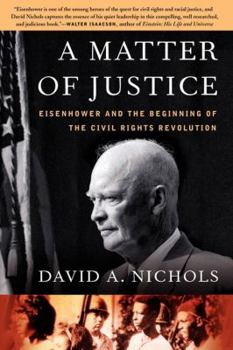A Matter of Justice: Eisenhower and the Beginning of the Civil Rights Revolution
Select Format
Select Condition 
Book Overview
Fifty years after President Dwight D. Eisenhower ordered troops to Little Rock, Arkansas, to enforce a federal court order desegregating the city's Central High School, a leading authority on Eisenhower presents an original and engrossing narrative that places Ike and his civil rights policies in dramatically new light. Historians such as Stephen Ambrose and Arthur Schlesinger, Jr., have portrayed Eisenhower as aloof, if not outwardly hostile, to...
Format:Paperback
Language:English
ISBN:1416541519
ISBN13:9781416541516
Release Date:September 2008
Publisher:Simon & Schuster
Length:368 Pages
Weight:0.80 lbs.
Dimensions:1.2" x 6.0" x 9.0"
Customer Reviews
4 ratings
Another Side of the Fifties
Published by Thriftbooks.com User , 16 years ago
The 1950s is often referred to nostalgically especially by those like me who grew up during this time period. Author David Nichols's book focuses on President Dwight Eisenhower's role during this often turbulent decade. Eisenhower ruled over five Supreme Court appointments, the first being Governor Earl Warren of California. Eisenhower had promised Warren the first vacancy that presented itself. This turned into being the position of Chief Justice which Warren filled. The 1954 decision of Brown vs. the Topeka, Kansas, Board of Education which overturned the 1896 case of Plessy vs. Ferguson which declared separate but equal facilities for both whites and blacks is dealt in detail. Eisenhower was so upset by the Brown decision of 1954 that he is often quoted as saying his appointment of Warren to be "the biggest damned fool mistake I ever made." Eisenhower didn't believe you could legislate moral values by saying, "You can't change the heart by passing a law." States rights, he believed, took precedence in government which also included schools. A rift developed between both Eisenhower and Warren, and has been detrimental to Eisenhower's reputation in regard to civil rights. Warren had come to resent Eisenhower the war hero, and Warren would have liked to have run for president in 1956 if Eisenhower had not run for reelection. In August of 1955 the murder of Emmett Till in Money, Mississippi, sparked the civil rights movement. In December of that same year Rosa Parks refused to give up her seat on a bus in Montgomery, Alabama. When asked why she refused to give up her seat she said, "I thought of Emmett Till, and I just couldn't." This anecdote is not in the book, but it has appeared in others. The 1957 crisis in Little Rock, Arkansas, was another incident that erupted when Governor Orval Fabus refused to allow blacks to enter Central High School. Eisenhower was hoping for some vacation time where he could play some golf, and he now had his golf time rudely interrupted by another pressing civil rights matter. This book provides the reader with some of the turbulent times that provided previews of coming attractions during the 1960s.
It is a Matter of Justice to read this book...
Published by Thriftbooks.com User , 16 years ago
A friend highly recommended this book. He told me that it gave him high respect for Eisenhower and his Attorney General, Herb Brownell. Having read quite a bit of Civil Rights history and several biographies of Dwight Eisenhower, I thought I knew the Eisenhower's record on Civil Right. Wrong! The author David A. Nichols, a history professor, was unknown to me before reading his A Matter of Justice. He did a superb job of providing detailed and extensive notes which gave me as a reader a great respect for the extent of his research and his perserverance in writing this book.
Ike, a new look
Published by Thriftbooks.com User , 16 years ago
I found this book to be quite educational. It reviews the situation at the time and Ike's past and places his actions in perspective. Neither fawning nor overly flattering, it give a clear view of a decent but conflicted man of the times. The evolution of Ike's moral compass was very well presented. In light of the recent election campaigns, it presents some important history.
deeds rathger than oratory
Published by Thriftbooks.com User , 17 years ago
David Nichols' work on Eisenhower's support for the cause of civil rights, as the blurbs on the back cover indicate, advances the historical record. Eisenhower's view was that the best way to advance the cause of civil rights was through action rather than oratory. This approach to government was a consistent theme of Eisenhower's modus operandi as reflected in Fred Grenstein's ground breaking work. While Nichols enhances Eisenhower's civil rights record by calling attention both to his actions and his public and private comments, he also acknowledges Eisenhower could have (should have?) used the bully pulpit of the presidency more in support of the first Brown decision and the civil rights movements. Nichols lays much of the blame for southern resistence to Brown I to the Court's timidity in its enforcement decision, Brown II, and claims that Eisenhower also was disappointed in Brown II. Eisenhower, whatever his motives and modus operandi, can be faulted for failing to recognize that a bully pulpit was needed in the aftermath of Brown I and that his overly legalistic and above the board approach stroked southern resistence. The repercussions of not using stronger rhetoric during his presidency caused ripples which reverberate today. While Eisenhower may have provided leadership, he failed to use all the tools of the presidency, including the bully pulpit, to provide moral leadership.






